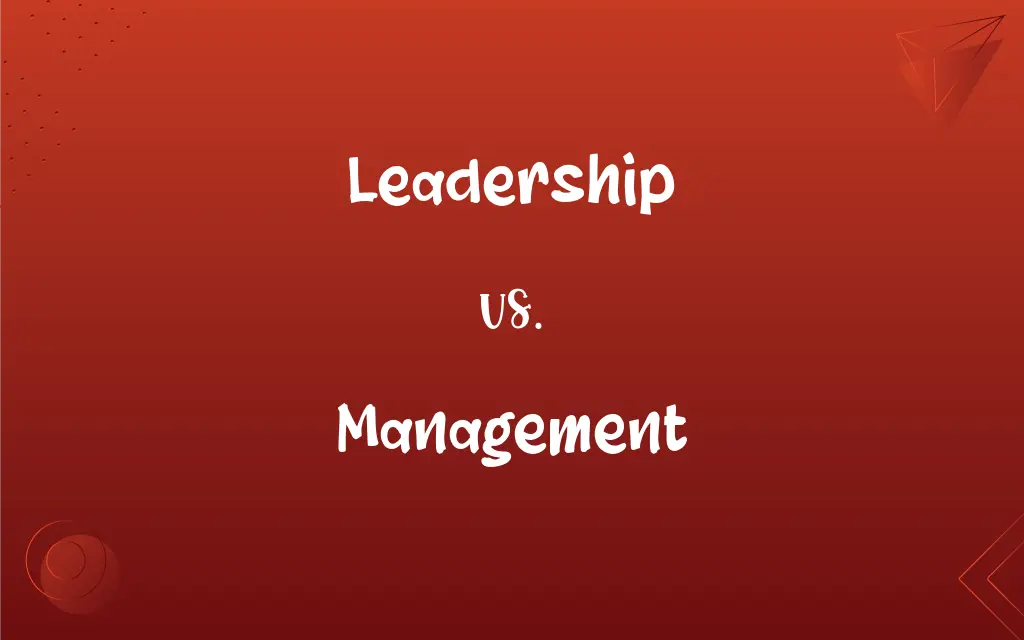Leadership vs. Management: What's the Difference?
Edited by Janet White || By Harlon Moss || Updated on June 6, 2024
Leadership is about inspiring and guiding people, while management focuses on organizing and controlling tasks.

Key Differences
Leadership embodies the act of leading a group of people or an organization with vision, inspiration, and motivation. It is about influencing others and setting a direction. On the other hand, management deals with the administration, control, and organization of tasks and resources within an establishment.
Leadership often relies on interpersonal skills, charisma, and the ability to inspire trust and confidence. It's about setting an example, being a role model, and encouraging others to follow. Conversely, management emphasizes processes, systems, and operational efficiency. It's about ensuring the day-to-day tasks are completed effectively and on time.
In a corporate setting, leadership seeks to create a vision and establish a clear direction for the team or organization. This vision serves as a guiding light, fostering innovation and encouraging growth. Management, in contrast, zeroes in on executing this vision by planning, organizing, and allocating resources efficiently.
The roles of leadership and management can sometimes overlap, but their core essences are distinct. Leadership is centered around human aspects like inspiration, motivation, and culture building. Management, meanwhile, revolves around tangible facets like resources, tasks, and results.
Comparison Chart
Focus
People and vision
Tasks and resources
ADVERTISEMENT
Primary Goal
Inspire and guide
Organize and control
Key Qualities
Charisma, vision, trust
Efficiency, organization, planning
Approach
Setting direction and influencing others
Ensuring operational efficiency
Outcome
Motivated and aligned team
Accomplished tasks and resource allocation
Leadership and Management Definitions
Leadership
Position or function of a leader.
He assumed the leadership of the team last year.
ADVERTISEMENT
Management
The process of achieving organizational goals.
Through careful management, they surpassed their sales targets.
Leadership
The act of guiding a group toward a common goal.
His leadership during the crisis was commendable.
Management
The act of organizing and controlling resources.
Good management is key to a successful business.
Leadership
The ability to influence and inspire others.
Her leadership qualities were evident from a young age.
Management
The administration of an organization.
The management decided to implement a new strategy.
Leadership
A display of command and control over situations.
His leadership in the project ensured its success.
Management
Overseeing and coordinating tasks and operations.
Her management skills were crucial for the project's completion.
Leadership
Setting a direction or vision for a group.
Under her leadership, the company thrived and expanded.
Management
Directing and controlling a group to meet its objectives.
Under his management, the team consistently outperformed their competitors.
Leadership
The position or office of a leader
Ascended to the leadership of the party.
Management
The act, manner, or practice of managing; handling, supervision, or control
Management of factory workers.
Leadership
Capacity or ability to lead
Showed strong leadership during her first term in office.
Management
The person or persons who control or direct a business or other enterprise.
FAQs
Can a person be both a leader and a manager?
Yes, many individuals embody both leadership and management roles simultaneously.
What's the core difference between leadership and management?
Leadership is about inspiring people, while management focuses on organizing tasks.
Is leadership inherent or can it be learned?
While some have innate leadership qualities, leadership skills can also be developed and honed.
Why is feedback essential in both leadership and management?
Feedback helps leaders and managers assess effectiveness, make improvements, and adapt to change.
How can leadership impact team performance?
Effective leadership can motivate, align, and drive teams to achieve greater outcomes.
What's the primary concern of management?
Management's main concern is ensuring efficient and effective completion of tasks and allocation of resources.
Does leadership always involve being at the top?
No, leadership can be displayed at any level, not just at the top.
What tools do managers typically use?
Managers use tools like budgets, schedules, and performance metrics.
Does leadership involve decision-making?
Yes, leadership often involves making strategic decisions that influence the direction of a group or organization.
What are the key elements of management?
Planning, organizing, directing, and controlling are fundamental elements of management.
How do leadership roles evolve in growing organizations?
As organizations grow, leadership roles may diversify, specializing in areas like strategy, culture, or external relations.
Is formal training essential for management roles?
While beneficial, many successful managers learn through experience and on-the-job training.
How do management strategies adapt to change?
Effective management is flexible, adjusting strategies based on evolving situations and feedback.
How do leaders handle conflict?
Leaders often mediate, facilitate dialogue, and find solutions to address and resolve conflicts.
How does leadership influence workplace culture?
Leadership sets the tone, values, and behaviors, significantly influencing workplace culture.
Is multitasking an essential management skill?
While helpful, the core management skills are prioritizing, delegating, and coordinating tasks.
Do all organizations require leadership?
While structures vary, all organizations benefit from effective leadership to provide direction and purpose.
Can technology replace certain management roles?
Technology can assist or automate certain tasks, but the human element of management remains vital.
Are leadership styles universal?
No, leadership styles vary based on culture, personality, and organizational needs.
Are management skills only relevant in corporate settings?
No, management skills are valuable in various settings, including non-profits, events, and households.
About Author
Written by
Harlon MossHarlon is a seasoned quality moderator and accomplished content writer for Difference Wiki. An alumnus of the prestigious University of California, he earned his degree in Computer Science. Leveraging his academic background, Harlon brings a meticulous and informed perspective to his work, ensuring content accuracy and excellence.
Edited by
Janet WhiteJanet White has been an esteemed writer and blogger for Difference Wiki. Holding a Master's degree in Science and Medical Journalism from the prestigious Boston University, she has consistently demonstrated her expertise and passion for her field. When she's not immersed in her work, Janet relishes her time exercising, delving into a good book, and cherishing moments with friends and family.































































